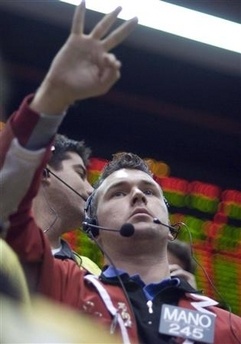Investors dump stocks after Fed's modest rate cut
Updated: 2007-12-12 08:03
NEW YORK -- US stocks sank on Tuesday after the Federal Reserve trimmed interest rates rather than slashing them, letting down investors who fear the economy might slip into recession unless the central bank becomes more aggressive.
|
|
Major indexes fell more than 2 percent after the Fed cut the benchmark fed funds rate for a third time to fortify the economy against a credit crunch and housing slump.
But the quarter-percentage-point cut, while expected, was considered modest while the accompanying statement failed to reassure investors that more cuts are coming.
The Fed also made a modest cut to the discount rate, which is the rate it charges to banks for direct, emergency loans, rattling those who had been expecting a decisive move to shore up credit markets.
Shares of large manufacturers and banks, including Boeing and Citigroup, both beneficiaries of lower interest rates, plunged after the Fed's decision.
Many traders were expecting a 50-basis-point cut, said Tim Biggam, lead option strategist at online brokerage thinkorswim, in Chicago.
"In addition, the Fed's outlook did not present a slam dunk case for a further rate cut, which led many traders to trim their long positions in stocks," Biggam said.
The Dow Jones industrial average slid 294.26 points, or 2.14 percent, to end at 13,432.77. The Standard & Poor's 500 Index dropped 38.31 points, or 2.53 percent, to 1,477.65. The Nasdaq Composite Index lost 66.60 points, or 2.45 percent, to 2,652.35.
It was the biggest one-day percentage decline for the Dow and the S&P 500 since November 7, when New York's attorney general, Andrew Cuomo, said his office was sending subpoenas to government-sponsored mortgage financiers Fannie Mae and Freddie Mac as part of a probe of the home loan industry.
While a quarter-percentage-point cut was widely expected, some economists had thought the Fed might offer a bolder half-point reduction in the rate, which governs overnight lending between banks.
The key federal funds rate was cut to 4.25 percent from 4.50 percent.
In a related move, the Fed cut the discount rate by 25 basis points, bringing it down to 4.75 percent from 5.00 percent.
Earlier in the day, Washington Mutual became the latest casualty of mortgage market turbulence. The shares of the savings and loan slid after it said it would cut its dividend, eliminate thousands of jobs and raise $2.5 billion in new capital. WaMu, whose shares lost 12.4 percent to $17.42, said it sees losses from mortgages increasing in 2008.
A Dow Jones index of home builders' shares, which had risen in anticipation of an aggressive Fed move, plummeted 9.8 percent.
Retailers were also hammered after the Fed decision, with the S&P retail index dropping 4.2 percent.
"People realize it's tough out there. They were looking for the Fed to 'quote unquote, come to the rescue' and now I think you're seeing the negative knee-jerk reaction on the quarter point cut," said Scot Ciccarelli, retail analyst at RBC Capital Markets.
Boeing and United Technologies Corp led the Dow lower, while Bank of America and Citigroup were among the top drags on the S&P 500.
Boeing shares dropped 4.3 percent to $88.70, while United Technologies fell 3.1 percent to $76.42 on the New York Stock Exchange.
Bank of America slid 4.3 percent to $44.65 and Citigroup shed 4.2 percent to $33.30.
Citigroup named Vikram Pandit, head of its institutional clients group, as chief executive and said Win Bischoff would serve as chairman, effective immediately.
The announcement on Tuesday afternoon, made just a moment before the Fed's decision, ended weeks of speculation over who would take the helm at the largest US financial services company. Citi has been seeking a replacement for former CEO Charles Prince, who departed on November 4 under pressure from shareholders frustrated by Citi's laggard performance.
AT&T AND MCDONALD'S BUCK THE TREND
Of the 30 stocks in the blue-chip Dow average, only two finished higher -- AT&T Inc and McDonald's Corp.
AT&T, the top US phone company, gained 4.1 percent to close at $39.46 on the New York Stock Exchange after it unveiled a stock-buyback program worth almost $16 billion at current prices and its biggest-ever dividend increase. Earlier in the day, AT&T's stock climbed as much as 7.4 percent to a session high at $40.69.
McDonald's stock advanced 2 percent to $63.13 on the NYSE, a day after the world's largest fast-food company said November same-store sales rose 8.2 percent. Earlier in Tuesday's session, McDonald's stock hit an all-time high at $63.49.
Volume was below average on the NYSE, with about 1.55 billion shares changing hands, below last year's estimated daily average of 1.84 billion.
On the Nasdaq, though, about 2.26 billion shares traded, ahead of last year's daily average of 2.02 billion.
Declining stocks outnumbered advancers by a ratio of about 5 to 1 on the NYSE, while on the Nasdaq, about four stocks fell for every one that rose.
|
|
|
||
|
||
|
|
|
|
